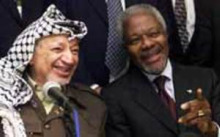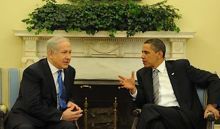Matt Rees's Blog - Posts Tagged "peace-talks"
Israeli settler sect: Messiah is coming
 GIVAT ONAN, West Bank—On this windblown outpost in the hills north of Jerusalem, a small group of Israeli settlers strives to bring the day of redemption promised, as they believe, in the Bible.
GIVAT ONAN, West Bank—On this windblown outpost in the hills north of Jerusalem, a small group of Israeli settlers strives to bring the day of redemption promised, as they believe, in the Bible.A controversial sect shunned by nearby Israeli settlements, the Brothers of Onan believe that by “spilling their seed” on the land of the ancient biblical Jewish homeland, they will hasten the coming of the Messiah. With the Israeli communities of the West Bank considered illegal under international law, the Onanists are the outcasts among outcasts. But they’re unperturbed.
“We can never give up this land,” says the group’s leader, Rabbi Meir Gedalia Kaplowitz. “You can ejaculate all you want in Tel Aviv or New York, but the Holy One, blessed be He, wants us to perform the miracle here.”
Kaplowitz sits in a messy caravan on a windy hilltop, taking a brief break from his endless routine of Talmud study and self-abuse. Wild-eyed and gaunt, he is the picture of the stereotypical Israeli settler extremist. Only, if anything, even more wild-eyed and gaunt.
The sect takes its name from the biblical Onan, who was ordered by his father Judah to impregnate Tamar, his brother’s widow, and to pass off the resulting children as belonging to his deceased brother. Not wanting to have children he couldn’t regard as his own, Onan fornicated with Tamar but at the moment of ejaculation he “spilled his seed.” God punished this disobedience by killing Onan.
Onanism has become a term used to describe such coitus interruptus, though it is also used for masturbation. In the Hebrew spoken on Givat Onan, masturbation is “onanut.”
“We’re proud to use that word for what we do,” says Haim Hercz, who occupies the caravan next to Kaplowicz. “But it's not all about Onan. Sometimes we call it flogging the Pharisee or chafing the camel. We have a sense of humor, just like people who have sex with women. But anyone can do that five or six times a day. We know that what we’re doing has a deeper purpose, and that’s what keeps us going.”
The Brothers of Onan celebrated Passover with a traditional Orthodox seder meal this week. (“Frankly it was nice to have something else to keep us occupied for six hours,” says Hercz.) But next week they plan to take their struggle to Tel Aviv, where they will pray and “shoot their short Uzis” outside the Israeli Defense Ministry to protest any restrictions on building in the settlements.
Successive Israeli governments have justified new construction in the West Bank by arguing that they are only satisfying “natural growth,” whereby the growing families of settlers must be accommodated with new homes. “Obviously that’s not fair on us,” says Kaplowitz.
Israelis who oppose the settlements say the Brothers of Onan are more than a dangerous fringe group. Orla Mohel, a Tel Aviv masseuse, founded Wank Watch to combat the influence of the group. “I’m concerned that a lot of people in Tel Aviv will see them as harmless ‘frotteurs,’” she says. “But they celebrate a story from Genesis in which a father forces a brother to have sex with his sister-in-law, tries to get a third son to marry her, then has sex with her himself.”
Harvard Law School professor Alan Dershowitz writes in his book “The Genesis of Justice” that Onan probably had non-penetrative sex with Tamar, or maybe anal sex.
“I didn’t go to Harvard and I’m not a lawyer, so I'm no expert on the Bible or anal sex,” responds Mohel. “But these Onanists also don’t want to give up the West Bank, which prevents a peace deal.”
Rabbi Kaplowitz contends that he’s no extremist. Rather he claims to represent the mainstream in Israel. “There are only a couple of dozen of us here, but there are thousands of others who’d like to join us. We’re out here in the lonely desert hills, doing something important for the redemption of the world. It’s not easy. We have very slow internet and sometimes youporn.com goes down for minutes at a time. Our thing is exhausting without visual aids.”
US Mideast envoy George Mitchell has condemned the Givat Onan outpost as “illegal under international law and pretty skeezy.” Mitchell also cited the 4th Century sage St. Athanasius of Paros as saying that “to have coitus other than to procreate is to do injury to nature.”
Kaplowitz rejected the criticism. “I don’t take sex advice from Greeks,” he said.
Published on March 31, 2010 23:59
•
Tags:
alan-dershowitz, april-fools, bible, book-of-genesis, george-mitchell, givat-onan, israel, judah, new-york, onan, onanism, peace-talks, self-abuse, settlements, talmud, tamar, tel-aviv, the-genesis-of-justice, west-bank
Good times, danger signs in West Bank
 BETHLEHEM, West Bank — The good news is that the West Bank is normal — kind of — and that people are content — sort of. The bad news, the Palestine Liberation Organization thinks it’s responsible for the good news.
BETHLEHEM, West Bank — The good news is that the West Bank is normal — kind of — and that people are content — sort of. The bad news, the Palestine Liberation Organization thinks it’s responsible for the good news.Palestinian President Mahmoud Abbas, who’s also the Palestine Liberation Organization (PLO) chief, has decided to stamp down on the man who’s actually made life bearable in the West Bank, Prime Minister Salaam Fayyad, and his plan to declare a unilateral Palestinian state in 2011.
At a meeting of the Fatah Revolutionary Council, effectively the PLO’s ruling body, Abbas said last week that only the PLO was allowed to make decisions on behalf of the Palestinian people.
"It’s not the factions or the governments that take ownership of decisions," Abbas said.
Abbas wants to continue on the path that has led the Palestinians and the Israelis nowhere. So-called “proximity talks,” in which they talk via U.S. mediators, are supposed to start again soon. They’re unlikely to change anything.
Fayyad, who’s a political independent appointed to his post by Abbas mainly because the Americans insisted on it, announced his plan last year for the declaration of a state. The idea: truly to ready Palestinian institutions for independence and to dare Israel — and the U.S. — to oppose it.
Fayyad’s ability to clean up the economy and reform the security forces has made him popular among Palestinians. He’s also seen as untainted by the violence and corruption of the two main political parties, Abbas’s Fatah and the Hamas rulers of Gaza.
That makes him a potential rival to Fatah. PLO chiefs fear that if Fayyad declares a Palestinian state and the U.S. cheers, maybe its bankrollers in Washington and Oslo and Brussels will cut the PLO out of the power and money loop. That, after all, is what the PLO is all about. “organization” is the operative word in the name of the PLO, rather than “liberation."
A visit to Bethlehem this week delineates the precise choice on offer between Abbas and Fayyad.
In the Dehaisha Refugee Camp, less than a square mile that’s home to more than 16,000 poor Palestinians, there are bulletholes in the walls of the U.N. girls' school, left over from the second intifada. A reminder of the final bankruptcy of the PLO and its failure to convert itself from an outlaw band into a true government after the signing of the Oslo Peace Accords in 1993.
The casualties of that long descent into destruction are painted all over the walls. On the pedestrian bridge the girls cross to reach their school, there’s a 10-foot graffito of Sa'id Eid, masked and firing a mortar. He was killed by an Israeli Apache helicopter in 2003. As the girls come down on the other side, they pass another big stencil in black paint. This time it’s Ayat Akhras, at 16 the youngest female suicide bomber, who left her home in Dehaisha in 2002 to kill herself, a 17-year-old Israeli girl and an aging supermarket guard. She raises a pistol like a naif Bond girl.
At the corner, a falafel restaurant is decorated with murals of all the martyrs of the Palestinians, from Ghassan Kanafani, writer and Popular Front activist killed by the Israelis in Lebanon in 1972, to a collection of the intifada’s most famous victims, and above them Khalil Wazir, the Arafat lieutenant assassinated by Israel in 1988.
A continuation of that fatal litany is, frankly, what’s offered by the “proximity” talks. Because they’ll lead only to frustration, a sense that nothing can be achieved by negotiation, and a resultant impetus toward violence.
What’s the alternative?
Mike Canawati, one of Bethlehem’s leading businessmen, describes trade in his tourist shop on the road to the Church of the Nativity, the site of Jesus’s birth, as “excellent, really excellent.” That’s the result of Fayyad’s ability to convince the Israeli army that checkpoints can be lifted and his commitment to a higher level of training among Palestinian security forces, so that tourists don’t fear to enter Bethlehem as they did for much of the last decade.
It isn’t a total shift. The dangers are simply less immediately apparent. Canawati still sits at his desk flanked by a screen with 16 different closed-circuit images of the store, the alley behind it, his black Hummer parked at the side of the building.
Only the night before we met, he had welcomed 700 Italian diners in his banquet hall near the church. “We should be thankful to these people for coming to our town,” Canawati said. During the dinner, a group of Fatah people entered and unfurled banners protesting that the Italians would later hold a meeting with Israelis in Jerusalem. “I had a big argument with them,” he said, “and I threw them out.”
Back in Dehaisha, I took my son to a birthday party at a friend’s home. My friend spent nine years in an Israeli jail without charge. He was, in fact, in jail seven years ago when the birthday boy was born. Now he’s studying for a Master’s degree in law.
A clown inflated sausage-balloons and tied them into the shape of swords. I was strangely relieved that they weren’t bent into Kalashnikovs.
When the birthday cake came out, the clown’s assistant emerged dressed as SpongeBob SquarePants. She sang “Happy Birthday” in Arabic with the aid of ear-splitting amplification and did some unexpected SpongeBob belly dancing moves.
Whatever Abbas and his PLO cronies say, that’s the kind of reality we should be wishing on the people of Dehaisha.
Published on May 05, 2010 05:34
•
Tags:
abu-jihad, abu-mazen, ayat-al-akhras, bethlehem, church-of-the-nativity, dehaisha-refugee-camp, fatah-revolutionary-council, gaza, ghassan-kanafani, hamas, hummer, israel, khalil-wazir, mahmoud-abbas, middle-east, palestine, palestinians, peace-talks, plo, refugees, salaam-fayyad, spongebob-squarepants, west-bank
All talk, no two states

At his White House press conference with Israeli Prime Minister Benjamin Netanyahu this week, United States President Barack Obama enthused that the talks about talks will probably lead to talks, and his assessment was that the Israeli government is ready to take part in those talks.
As the camera shutters clicked and the Israeli prime minister cocked his eyebrow in the way he favors when trying to look smarter than everyone else in the room, the most powerful man in the room said: “We expect proximity talks to lead to direct talks, and I believe that the government of Israel is prepared to engage in such direct talks.”
If that sounds like a lot of nothing, that’s because underlying all the talking about talks there’s a growing sense that none of it will ever lead anywhere. Anywhere good that is. The talks are supposed to be about what’s known as the “two-state solution,” in which the land of Israel, the West Bank and Gaza is divided into a state for Israel and a state for the Palestinians.
More and more Israelis and Palestinians, however, acknowledge (or fear) that it’s too late to effectively divide the land as the Israeli and Palestinian populations grow and merge geographically. All the talking about talks and the climate of fear in both nations’ polities delays the chance of a final deal. That, in turn, allows changes on the ground to make a two-state solution still further away.
“The two-state solution is really not an option anymore,” said Gideon Levy, a columnist for the Israeli newspaper Ha’aretz and author of a new book of essays about the Palestinians called “The Punishment of Gaza.”
“It’s on its last legs,” he said.
Read the rest of this post on my blog The Man of Twists and Turns.
Published on July 09, 2010 06:40
•
Tags:
barack-obama, benjamin-netanyahu, gaza, gideon-levy, hamas, hebrew-university, israel, jews, mahmoud-abbas, palestinians, peace-talks, sergio-della-pergola, settlements, two-state-solution, united-states, west-bank



